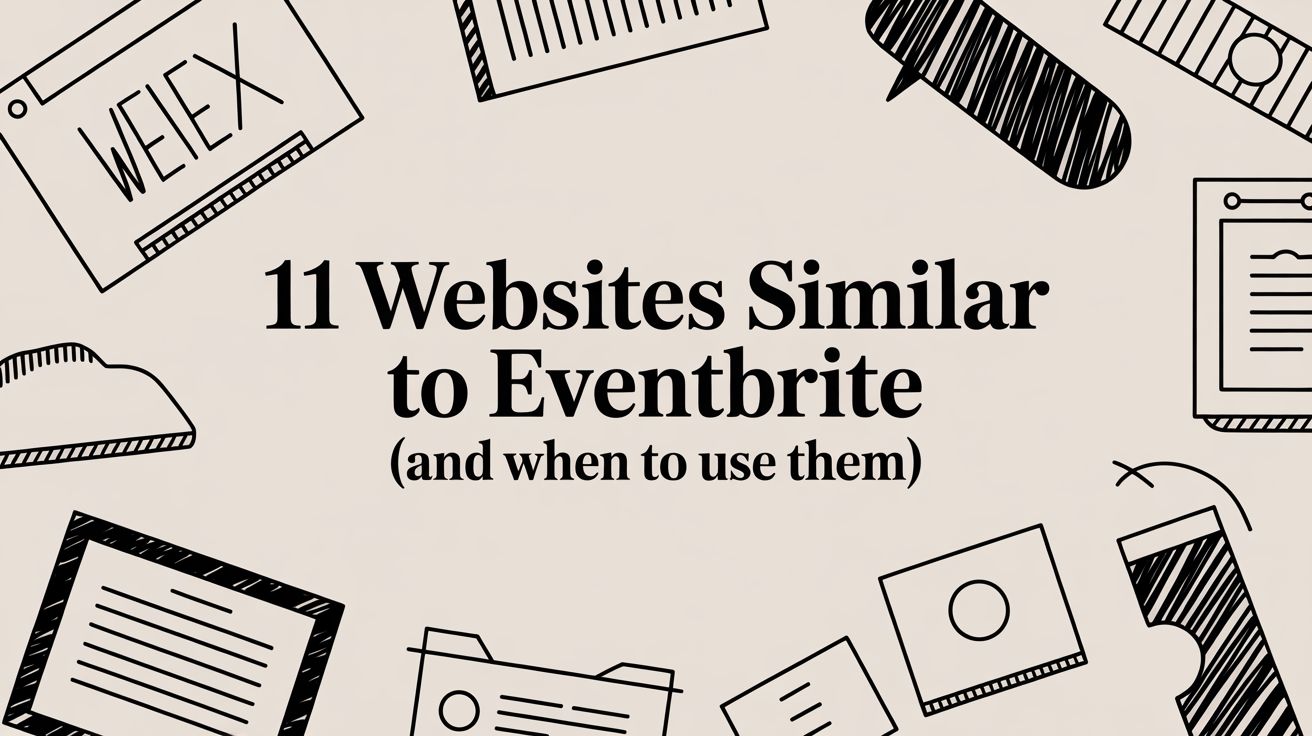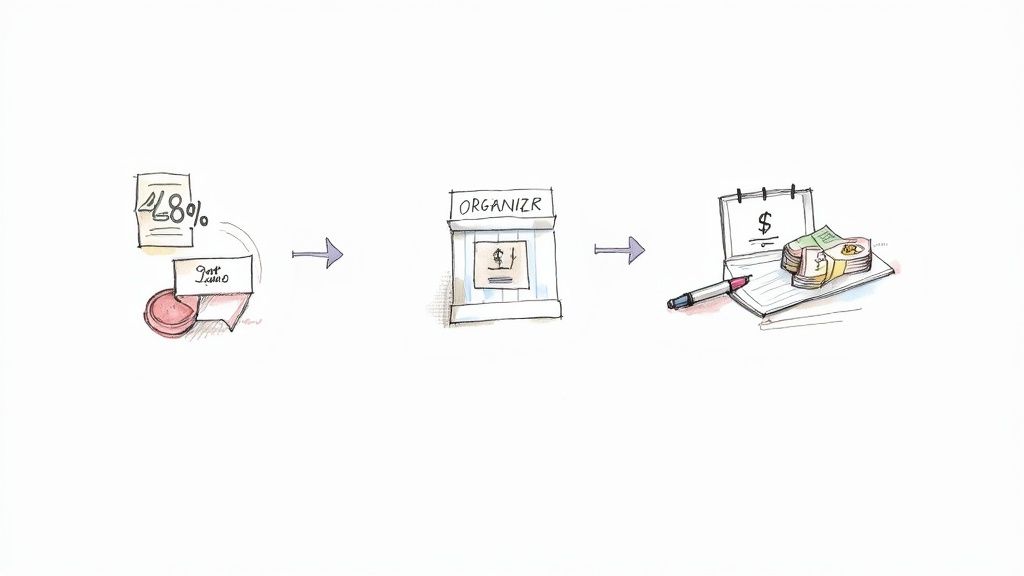11 Websites Similar To Eventbrite (And When To Use Them)
Will Townsend
·
You're probably here because Eventbrite’s fees are starting to feel like a bad joke. You’re not alone. The good news? There are some fantastic websites similar to Eventbrite out there, like Ticketbud, Ticket Tailor, and RSVPify. Each one has a different take on pricing and features, built for different kinds of people.
Why Look for Eventbrite Alternatives?
Eventbrite is a giant for a reason. It’s a powerful, known name that can handle almost anything. But if you're a workshop host or a pop-up chef, those percentage-based fees really eat into your profits. This guide isn't another boring feature list. We're going to get into who each platform is really for.

We’ll dig into options for everything from a ten-person yoga class to a 1,000-attendee indie conference. We'll look at the real costs, the setup headaches, and which tools actually help you build a community.
This guide is for anyone pouring their heart into an event and just needs a tool that supports them without taking a huge cut. We get it. We're those people, too.
How We Gather Has Changed
The events world is different now. It's not just about filling a room anymore. As of early 2024, in-person events still lead, making up about 60% of all events. But virtual events now claim a solid 35%.
This means people expect different things. For instance, 35% of people join online events for learning, and 31% show up for convenience. Your ticketing platform has to keep up. You can dig into more stats on how event trends have evolved on eventbrite.com.
This is where the hunt for websites similar to Eventbrite gets interesting. Different tools are built for these different worlds.
| Feature Focus | Eventbrite | Key Alternatives (Examples) | Who It's For |
|---|---|---|---|
| Pricing Model | Percentage + Fixed Fee per ticket | Flat-fee per ticket or Monthly Subscription | Organizers who want predictable costs. |
| Branding | Limited, Eventbrite branding is prominent. | Fully customizable pages to match your brand. | Creators who want a seamless look. |
| Payout Speed | After your event ends (usually 3-5 days). | Instant or daily payouts to your account. | Anyone who needs to pay vendors upfront. |
| Target User | Everyone, from huge festivals to small meetups. | Niche-specific (e.g., non-profits, music). | Organizers needing specialized features. |
Ultimately, choosing the right platform comes down to what you value most. Is it brand recognition? Rock-bottom fees? Or just getting paid fast? Let's break it down so you can find the right fit for your event.
How Ticketing Platforms Actually Make Money
Let's talk about money. Not in vague terms, but in the actual dollars that leave your account. The biggest difference between Eventbrite and its competitors isn't features. It’s how they charge you. Getting this wrong can quietly drain the profit from your event.
You’re generally looking at three models: percentage-based fees, per-ticket flat fees, and monthly subscriptions. Understanding the difference is critical.

Unpacking the Pricing Models
Percentage-based platforms are what most people know. They take a slice of every ticket you sell, often plus a fixed fee. It feels "free" to start, but those fees grow fast as your ticket prices or attendance numbers rise.
Then you have flat-fee platforms. It's simple: you pay a fixed amount for each ticket, maybe $1. This makes your costs totally predictable. You know exactly what you'll owe whether a ticket costs $20 or $200. It’s refreshingly simple.
Finally, there are monthly subscriptions. You pay a set fee every month, no matter how many tickets you sell. This can be great for organizers running lots of events. It's often overkill if you only host a few gatherings a year.
The real choice isn't just about the fee structure. It's about who the platform is built to serve. Percentage models serve the platform's growth. Flat-fee models serve your bottom line.
Here’s a real story. I ran a two-month workshop series. For the first event, I used a platform that took 3.5% + $1.59 per ticket. I sold a hundred tickets at $50 each. The total fees were $334. Ouch.
The next month, I switched to a tool with a simple $1 flat fee. For the same event, my total cost was $100. That $234 difference went straight into my pocket. It paid for better snacks and a microphone that didn't crackle.
Real Cost Comparison Per Ticket
Let's see how these fees actually play out. Here’s a simple table showing the difference on a low-cost and mid-range ticket.
| Platform | Pricing Model | Cost on a $25 Ticket | Cost on a $100 Ticket | Best For |
|---|---|---|---|---|
| Eventbrite-Style | 3.7% + $1.79 | $2.72 | $5.49 | Organizers needing big brand recognition. |
| Flat-Fee Model | $1.00 per ticket | $1.00 | $1.00 | Hosts wanting simple, predictable costs. |
| Subscription Model | $50/month + 0% | Varies | Varies | High-volume organizers running events monthly. |
The numbers don't lie. For higher-priced tickets, the percentage model really eats into your revenue.
The market for these platforms is wild. Eventbrite, founded in 2006, has a 30% market share. But giants like Ticketmaster still control a massive 63% of the U.S. online ticket market. It's a battleground. For more, Bizzabo has some fascinating event marketing stats.
Beyond fees, payout schedules can kill you. Many platforms hold your money until after your event. This can crush your cash flow if you need to pay for a venue or speakers upfront. Look for platforms that offer daily or instant payouts. It's your money.
Even for free events, the pricing structure reveals a platform's entire philosophy. You can learn more in our guide to free event ticketing software.
Simple Ticketing Tools For Community Builders
If you're running a yoga class or a weekend workshop, you don't need a million features. You need something fast, simple, and not built for a corporate mega-conference. This part is for you.
Big platforms are powerful, but they feel impersonal. Sometimes you just want a tool that understands community events, where every ticket sold is a small victory.
Luma: A Hub For Recurring Events
Luma has a loyal following among creators who host regular events. It’s great for building a community because signing up for your next workshop feels like joining a club. Its interface is clean, and the free tier is generous.
The main trade-off? Branding. Your event page looks nice, but Luma’s brand is always front and center. For some, that’s a deal-breaker. They want their own logo and colors, not the platform’s.
Mixily: For Beautifully Simple Pages
Mixily is all about elegance and simplicity. You can create a beautiful, single-page event site in minutes. It's incredibly intuitive. It strips away all the complex settings you don't need.
But its strength is also its weakness. Mixily is so simple that it lacks deeper analytics. If you need to track detailed sales data, you'll probably hit a wall. It’s perfect for starting, but you may outgrow it.
The best tool for a community builder isn't the one with the most features. It's the one that gets out of your way.
I ran into this myself. I tried to organize a pop-up cooking class series. The platforms I tried were too clunky or plastered their brand all over my page. I wasted hours wrestling with settings I didn't need. It was just frustrating.
This is why we started building Ticketsmith. I'll confess, it came from that frustration. We wanted a tool that let us use our own custom branding, charged a flat fee, and could be set up in minutes without any code.
It's currently in waitlist mode. One flaw is our analytics dashboard is still pretty basic. But it saved me from ever paying another percentage-based fee. On my last $50 ticket event, that was a $234 savings. For more advice, check out our guide on how to organize a community event.
If you’re just trying to gather people you care about, your tool should make that easier. You can join the waitlist at ticketsmith.co.
Heavy-Duty Platforms For Conference Organizers
Selling tickets for a workshop is one thing. Running a multi-day conference with hundreds of attendees is a different beast. This is where simple tools crack under pressure. You need something built for complexity.
You're now in the world of tools designed for session scheduling and speaker management. This is the territory of platforms like Bizzabo and Cvent. They’re the big guns, and they have a price to match.

When Does Paying a Premium Make Sense?
These platforms aren’t just websites similar to Eventbrite. They are command centers for your event. They handle complex registrations, build custom mobile apps, and give you powerful analytics.
The trade-off is clear: you get massive power, but it comes with a steep learning curve and a big cost. Subscriptions can run into thousands of dollars per year. It's a serious investment.
So, when does it pay off?
You have multiple tracks. If attendees need to build their own schedules, you need a platform that can manage that chaos.
Speaker management is critical. You need a central hub to collect bios and presentations without losing your mind in emails.
Networking is a key selling point. These platforms often include matchmaking features and apps to help attendees connect.
Investing in a heavy-duty platform is about buying back your time and sanity. The cost is an insurance policy against logistical failure.
A friend learned this the hard way organizing a 500-person tech conference. To save money, they started on a cheaper platform. It was pure chaos.
They spent over 40 hours manually creating schedules in a Google Sheet. Every time a speaker had a conflict, the entire schedule had to be reworked. They were drowning in emails.
Midway through planning, they pivoted to Bizzabo. It cost an unplanned $4,000, but it saved the event. The platform automated the schedule and freed up the team to focus on the actual content, not logistics.
The Financial Health of the Industry
It's a tough business. Even the giants face challenges. Eventbrite reported gross revenue of about $300.86 million but still has operational losses. A competitor like Blend Labs recorded $162.02 million in revenue but had even greater net losses. This shows that turning a profit is a constant struggle. You can discover more insights about the event tech sector on marketbeat.com.
This financial pressure often trickles down to organizers as higher fees. For large conferences, the value is there. For smaller events, it's total overkill.
Specialized Ticketing For Niche Creators
Sometimes, a general tool doesn’t cut it. You shouldn't force a generic platform to handle an event when a specialized one exists. If your needs are specific, there's probably a tool built just for you.
This is where you find platforms that serve a particular crowd. Are you a musician booking a tour? A tool like Bandsintown is designed for that. For non-profits, platforms like Givebutter and Zeffy are built around fundraising.

The Power of Niche-Specific Features
The magic of a specialized tool is a tailored experience. A platform for pop-up chefs might have built-in features for dietary restrictions. One for small theaters will have visual seat mapping. These are core to the platform because the creators know what you actually need.
The trade-off? They can be less flexible. You swap broad functionality for deep, niche-specific power. It's a smart trade if you plan on staying in your lane.
When a platform is built for everyone, it's often perfect for no one. A specialized tool speaks your language and solves the problems you actually have.
I learned this the hard way trying to manage a small retreat with lodging. The goal: sell 50 tickets with three room choices. The generic platform I chose had no way to track room inventory. I oversold the private rooms by two spots. I spent a frantic afternoon on the phone, offering partial refunds and apologizing. After paying back $150 and dealing with the embarrassment, I found a retreat-specific tool that handled lodging perfectly. You can see the messy spreadsheet I used to fix it all in this Google Doc.
Matching Your Event to the Right Platform
To save you a similar headache, here's a quick guide to help you match your event type with a platform built for it.
| Event Type | Recommended Platform | Key Feature | Pricing Note |
|---|---|---|---|
| Non-Profit Fundraisers | Givebutter or Zeffy | Donor-covered fees | Essentially free for the organization. |
| Live Music Gigs | Bandsintown for Artists | Tour date promotion | Focuses on fan engagement, not just sales. |
| Intimate Supper Clubs | Tock | Reservation & deposit system | Higher-end, built for restaurant experiences. |
| Online Courses/Webinars | Podia or Teachable | Integrated course hosting | A full learning platform. |
| Local Theater/Venues | Ticket Tailor | Simple seat mapping | Low, flat-fee pricing for assigned seating. |
For many creators, the ideal tool doesn't need to do everything. It just needs to do your thing really well.
That’s why we're building Ticketsmith. It works for five attendees or five thousand. We made it for real people who need to get a beautiful, branded page up in minutes with fast payouts and a simple flat fee. It’s on a waitlist, and we'd love for you to join us at ticketsmith.co.
How to Choose the Right Platform for You
Okay, we've covered a lot. How do you actually sift through all these websites similar to Eventbrite and pick one?
Here's the secret: It's not about finding the single "best" platform. It’s about finding the one that fits you and your event, right now.
Forget the endless feature-comparison charts. The choice gets clearer when you answer four simple questions. Be honest with yourself.
Four Questions to Settle the Debate
Answering these will probably eliminate most of the options for you.
What's my real budget for fees? Look at your ticket price and do the math. On a $150 ticket, a 3.7% + $1.79 fee is $7.34. A flat fee might be $1. Does that difference matter to your bottom line? For a small workshop, it absolutely does.
How important is my brand's look and feel? Do you need your event page to feel like a part of your own website? Or are you okay with the platform's branding taking over? There’s no wrong answer, but it's a critical dividing line.
How much time can I really spend on setup? Be honest. If your event is next week, you don't have time to master a complex system. You need something you can get running in minutes. Simplicity is a feature.
What's the one feature I can't live without? Is it assigned seating? The ability to manage lodging? A beautiful mobile app? Pick just one non-negotiable. This will instantly rule out a huge chunk of platforms.
The goal isn't to get it perfect forever. It's to get it right for your next event. You can always switch later. Start with what's easiest and most cost-effective today.
For a lot of small organizers and creators, the answers point toward a simple, flat-fee tool. One that prioritizes custom branding, fast payouts, and a setup process that takes minutes, not days.
This is exactly why we're building Ticketsmith. It’s not for massive, multi-track conferences. It’s for real people pouring heart into workshops, pop-ups, and local gatherings.
We’re still in waitlist mode, but if simplicity and fair pricing sound good, we’d love for you to join us. You can find more practical advice on our blog, including the best way to sell tickets.
Ready for ticketing that just works?
Join the waitlist at ticketsmith.co.
A Few Lingering Questions
When people are weighing options, a few questions always come up. We've heard them all from fellow event organizers, so let's tackle them head-on.
What’s the cheapest Eventbrite alternative?
This is a tricky question. "Cheapest" depends on your ticket price. If you’re selling $10 tickets, a percentage fee might look fine. But the moment you sell tickets for $50 or $100, that model gets painful, fast.
For most independent organizers, a flat-fee platform will almost always be the cheapest option. A simple $1 per ticket fee will save you a small fortune compared to Eventbrite’s 3.7% + $1.79 fee. Always run the numbers for your specific price.
Which platform is best for free events?
This one’s pretty easy. Almost every platform—Eventbrite, Ticket Tailor, and Luma included—will let you manage free events for $0. It's how they get you in the door.
The real difference for free events isn't price, but experience. Need a quick RSVP page? A tool like Mixily or Luma is great. But if you care about how your brand is presented, look for a platform that doesn't plaster its own logo all over your page.
Can I just use my own payment processor to avoid fees?
The short answer is almost always no. Most ticketing platforms are closed systems. They bundle their software with a required payment processor (usually Stripe or PayPal, with their own fees added on top). This is their business model.
Trying to bolt on your own processor would be a technical mess. It defeats the purpose of using a tool designed to make your life easier. A better way to avoid high fees is to find a platform with a fairer pricing structure, like a simple flat fee. You get a hassle-free experience without getting skimmed.
At Ticketsmith, we're building the ticketing platform we always wanted. It's focused on clean branding, dead-simple flat-fee pricing, and getting you paid quickly. If that sounds like what you've been looking for, you can join the waitlist below.
Join the waitlist
Be the first to know when Ticketsmith launches. Get exclusive access and early-bird pricing.
Written by
Will Townsend
Founder, Ticketsmith
Writes practical guides on event ticketing, pricing, and promotion for independent organizers.